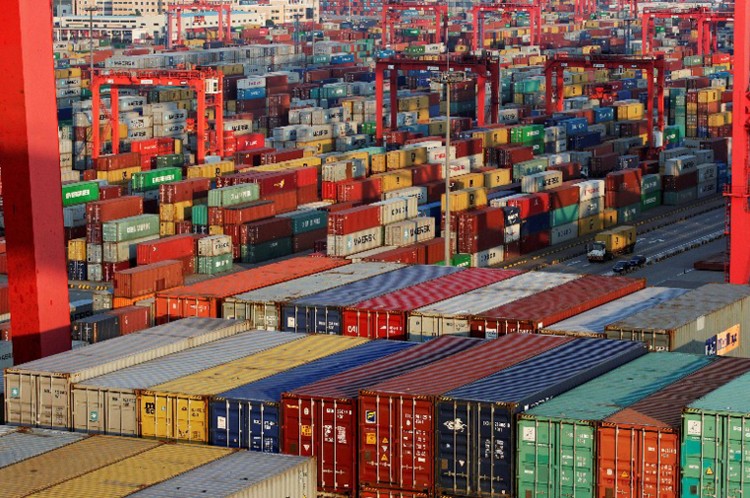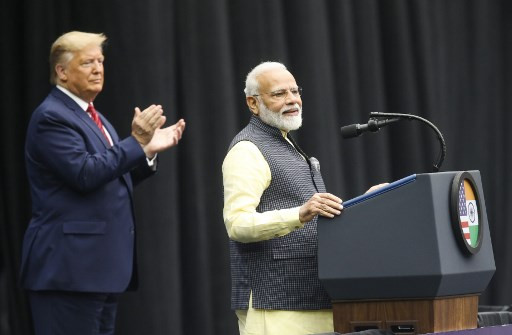Popular Reads
Top Results
Can't find what you're looking for?
View all search resultsPopular Reads
Top Results
Can't find what you're looking for?
View all search resultsCompanies face a new reality of Trump tariff chaos
Companies may try to diversify supply chains, but Trump's reciprocal 34 percent tariff on China was accompanied by 46 percent and 49 percent tariffs on Vietnam and Cambodia, respectively - all Asian countries where companies had been shifting output.
Change text size
Gift Premium Articles
to Anyone
N
ow that the United States has instituted broad tariffs worldwide, businesses will be forced to adjust - but the options to cope with the greater-than-expected levies are limited and unpalatable for companies and their customers.
US President Donald Trump ramped up his trade war against the globe on Wednesday with tariff rates ranging from 10 percent to nearly 50 percent, depending on the country, in a move economists warned would raise costs, threaten jobs, slow growth and isolate the United States from a system of global trade it pioneered and furthered over several decades. Trump says the levies will bring jobs back to the United States - but executives in the immediate aftermath were focused on possibly raising prices, reducing shipments to the world's largest economy, or just cutting back investment activity outright.
"This is how you sabotage the world’s economic engine while claiming to supercharge it," said Nigel Green, CEO of global financial advisory deVere Group. "The reality is stark: these tariffs will push prices higher on thousands of everyday goods - from phones to food - and that will fuel inflation at a time when it is already uncomfortably persistent."
Trump sees tariffs as a way of protecting the domestic economy from unfair global competition and a bargaining chip for better terms for the US.
The most common method of dealing with tariffs is to raise prices, passing along the cost to customers for as long as they can stand it. Other companies may try to diversify supply chains, but Trump's reciprocal 34 percent tariff on China was accompanied by 46 percent and 49 percent tariffs on Vietnam and Cambodia, respectively - all Asian countries where companies had been shifting output.
The effect could be to boost the price of retail goods, evident in the aftermath of the announcement, when retailing giants like Walmart and Target both lost more than 6 percent in post-market trading, while specialty names like Lululemon dropped more than 10 percent. Target and Best Buy have warned they will have to raise prices, but their margins are more likely to be squeezed, and Target and Walmart have been trying to negotiate with Chinese suppliers already dealing with a slowed economy.
"The first thing right now - and everyone is doing this - is we're sending letters to announce we're going to do price increases," said Bill Canady, CEO of Arrowhead Engineered Products, a US maker of replacement parts, ahead of the tariff announcement. He said the company is also working with Asian suppliers to see if they will take some of the cost.
Some European companies that primarily serve higher-income consumers were already planning on raising prices even before the 20 percent tariffs that European Union nations will face. Italian premium coffee maker Illycaffe and Ferrari have both said they will boost prices, something that well-heeled buyers of sports cars can more easily absorb.
The White House says tariffs will encourage more on-shoring, similar to the revamped USMCA trade deal Trump signed during his first term that encouraged manufacturing activity to shift away from China to Mexico or Canada. German fan and motor maker ebm-papst, for example, is currently deciding whether to build a third production plant or expand its existing site in Tennessee. The group's CEO, Klaus Geissdoerfer, said he had initially thought of a new plant in Mexico, but "some are saying, 'maybe it's better to go to the USA after all because we'll have to pay customs duty in Mexico.'"
Still, some importers may elect not to bring goods to the United States because of the tariffs. The United States is a major importer of automobiles from South Korea, Japan, Germany and other traditional allies as well as high-value technology goods. "The reciprocal tariffs are going to make it fiscally irresponsible for most importers to keep bringing into the US," said Erik Rosica, sales supervisor at freight logistics company OEC Group New York. "These companies would have to pass on a major cost increase to consumers to make it feasible which, frankly, consumers might not be willing to pay."
The most severe risk, according to executives interviewed by Reuters, is that businesses will pull back from spending due to uncertainty. Several executives said they had spent the last few months accelerating purchases to bring inventories into the United States from overseas. Automakers, aerospace companies, retailers and industrial names all increased imports - which ballooned the US goods trade deficit to a record $157 billion in January - in advance of the tariffs. Now, they are more likely to hold off on spending plans.
"They're going to batten down the hatches, not invest, don't do any deals, and take out costs to try to get ahead of the coming economic whatever-it-is-going-to-be - malaise, or it could be a recession," said Bill George, former CEO of Medtronic and executive fellow at Harvard Business School.










